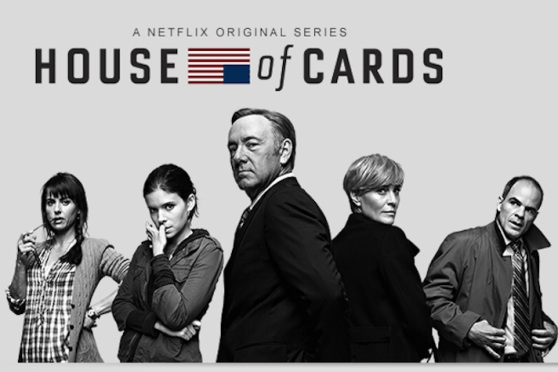
I Like Being Part of an Algorithm Aimed at Getting Me to Watch More TV
Netflix has been pretty transparent about the fact that their new series House of Cards was created by using their own data to target a certain type of viewer, understand what they watch, what actors they like and what directors they prefer and mash those things together. They saw that a certain type of viewer prefers the old British series House of Cards, David Fincher and Kevin Spacey and voila, mashed they are.
This has spawned a lot of dialog around just how much people can tolerate the idea of an artistic product being spawned from data rather than pure inspiration. Salon published an article with the title How Netflix is Turning Viewers into Puppets, with the subhead, “‘House of Cards’ gives viewers exactly what Big Data says we want. This won’t end well.” The essay itself is actually pretty sensible/ not sensational, making me think that a web editor decided to give it a misleading title for #madhits, but it definitely furthered the conversation about just how uncomfortable with this we all are.
My first impression, upon learning that this was the first result of Netflix mining data to create product, was to be somewhat flattered. You mean you studied our viewing behavior and came up with a dark, challenging political drama and not the next Jersey Shore? It’s kind of like if your parents studied your eating habits for a week to come up with the absolute dream dinner for you and it was a salad with sparkling water. Who knew I was so … healthy? Who knew we were such a good audience?
Upon further reflection, it’s clear that House of Cards was designed to target not just the average viewer, but influentials, i.e. the kind of people who write articles on the Internet about Netflix. The more I look at it, the smarter their strategy seems.
For me, the idea that inspiration doesn’t come from nowhere, but from complex amounts of information and analysis is relieving. Maybe this is because I work in marketing and am used to everything going that way, but also because the idea of inspiration coming from say, the heavens or a muse or nowhere in particular is hard to deal with as a creative person. But I don’t think every creative person is the same. Some people like to generate ideas to solve a problem or just to engage in combinatorial play, while for other people, as Bukowski would say, stories just “come bursting out of you.” The stories that come “bursting” from people are important, because they’re told out of catharsis and necessity. But they aren’t always there, and that’s when the other two methods come in handy.
House of Cards is definitely the result of needing to solve a problem (how can they compete with HBO and also just plain take advantage of an opportunity to grow their business?) and also combinatorial play, granted that it’s the data-driven kind.
I have a hard time being shocked at the idea that any kind of network is creating programming this way. While Netflix is doing it differently, almost everything I see seems to be a mashup of what people think people want to watch. Look at the movie Spring Breakers. It’s clear that Harmony Korine was like, “people like Disney stars, boobs and guns. Let’s make a movie about that.”
When this type of content creation becomes a problem is when a lot of resources are wasted chasing the favor of the lowest common denominator. Isn’t that exactly what converted MTV from a hugely influential part of pop culture into a garbage channel that features only “guilty pleasure” reality TV? Netflix was smart by raising the bar for the kind of TV audiences want tailored to their preferences, which actually gives them an opportunity to become influential and more importantly, bring a certain point of view to their programming.
I’m excited to see what Netflix creates next. I just hope that when they look at my viewing behavior, they know which shows I’m only watching while I’m doing chores, and which ones I’m watching obsessively because they’re actually good.

